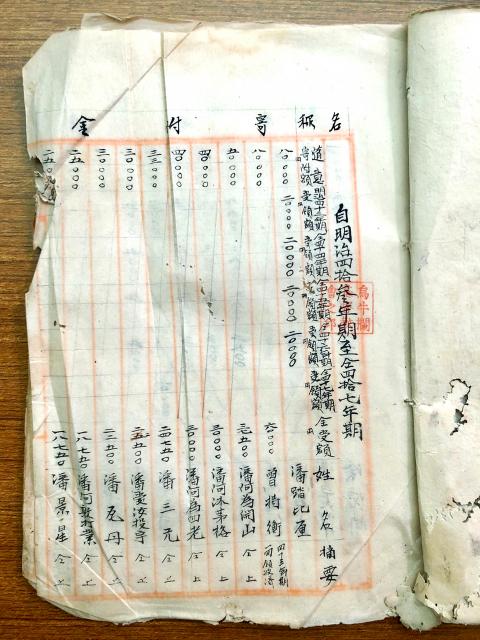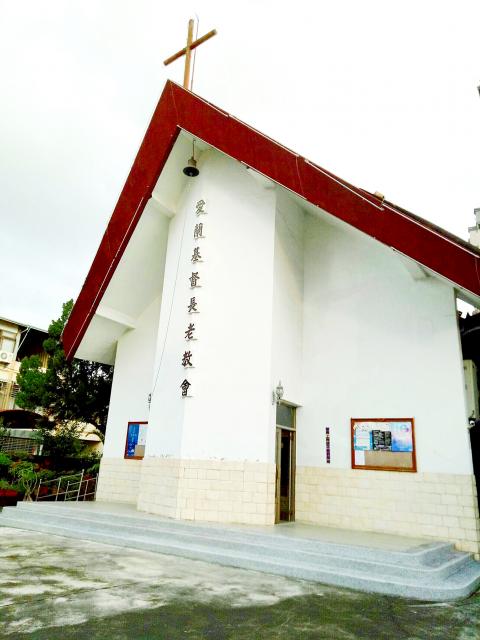The Nantou County Cultural Heritage Association has discovered artifacts that have been kept at Ailan Presbyterian Church in Nantou County’s Puli Township (埔里) for more than a century.
Established in 1871, the church in Ailan Borough (愛蘭) is the oldest in Puli.
It was one of the first churches to be established in Taiwan after Christian missionaries arrived in 1865, pastor Chen Ching-en (陳清恩) said.

Photo courtesy of Liang Chih-chung
At the time, the area was inhabited by the Pazeh people, and church data show that in late December 1871, the entire community converted to Christianity, he said.
Among the artifacts preserved by the church is an account of the donations it received from 1910 to 1913, said association chairman Liang Chih-chung (梁志忠), who discovered them while surveying religious establishments.
Parishioners made donations to repair the church, which was called Wuniulan Chapel (烏牛欄禮拜堂) at the time, he said.

Photo: Chen Feng-li, Taipei Times
The records show that many Pazeh people were surnamed Pan (潘), and some had names as long as five or six characters, he said.
In the church’s possession is also a passbook that tracked funds donated by parishioners toward the construction of new buildings, he said.
By 1949, the church had saved more than 200,000 Old Taiwan dollars, he said, adding that it withdrew 80,000 dollars on June 13, 1949, leaving 120,000 dollars in the account.
However, just two days later, the passbook was stamped with words indicating that every 40,000 Old Taiwan dollars would be exchanged for NT$1, turning the church’s savings into NT$3, he said.
The passbook is a witness to the history of rapid devaluation of the Old Taiwan dollar after the Chinese Nationalist Party (KMT) government issued the New Taiwan dollar, he said.
When the church was established, Taiwanese society valued men more than women, and women’s level of education was generally low, Chen said.
However, many Pazeh women in the area attended Chang Jung Girls’ High School in Tainan and many returned to teach at Ailan Elementary School upon graduation, he added.
This story has been amended since it was first published to correct the dates.

Taiwan is stepping up plans to create self-sufficient supply chains for combat drones and increase foreign orders from the US to counter China’s numerical superiority, a defense official said on Saturday. Commenting on condition of anonymity, the official said the nation’s armed forces are in agreement with US Admiral Samuel Paparo’s assessment that Taiwan’s military must be prepared to turn the nation’s waters into a “hellscape” for the Chinese People’s Liberation Army (PLA). Paparo, the commander of the US Indo-Pacific Command, reiterated the concept during a Congressional hearing in Washington on Wednesday. He first coined the term in a security conference last

Prosecutors today declined to say who was questioned regarding alleged forgery on petitions to recall Democratic Progressive Party (DPP) legislators, after Chinese-language media earlier reported that members of the Chinese Nationalist Party (KMT) Youth League were brought in for questioning. The Ministry of Justice Investigation Bureau confirmed that two people had been questioned, but did not disclose any further information about the ongoing investigation. KMT Youth League members Lee Hsiao-liang (李孝亮) and Liu Szu-yin (劉思吟) — who are leading the effort to recall DPP caucus chief executive Rosalia Wu (吳思瑤) and Legislator Wu Pei-yi (吳沛憶) — both posted on Facebook saying: “I

Sung Chien-liang (宋建樑), who led efforts to recall Democratic Progressive Party (DPP) Legislator Lee Kun-cheng (李坤城), was released on bail of NT$80,000 today amid outcry over his decision to wear a Nazi armband to questioning the night before. Sung arrived at the New Taipei District Prosecutors’ Office for questioning in a recall petition forgery case last night wearing a red armband bearing a swastika, carrying a copy of Adolf Hitler’s Mein Kampf and giving a Nazi salute. Sung left the building at 1:15am without the armband and covering the book with his coat. Lee said today that this is a serious

A mountain blaze that broke out yesterday morning in Yangmingshan National Park was put out after five hours, following multi agency efforts involving dozens of fire trucks and helicopter water drops. The fire might have been sparked by an air quality sensor operated by the National Center for High-Performance Computing, one of the national-level laboratories under the National Applied Research Laboratories, Yangmingshan National Park Headquarters said. The Taipei City Fire Department said the fire, which broke out at about 11am yesterday near the mountainous Xiaoyoukeng (小油坑) Recreation Area was extinguished at 4:32pm. It had initially dispatched 72 personnel in four command vehicles, 16